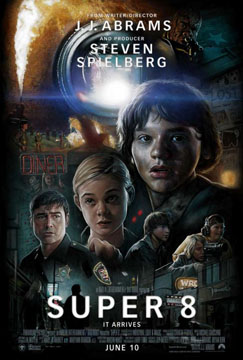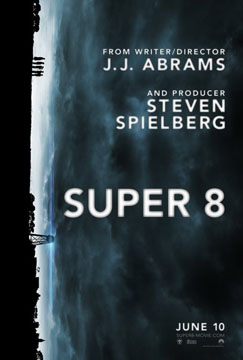Nick Nunziata: J.J. Abrams and Steven Spielberg. When you hear both names together it evokes something huge by sheer weight of their collective weight, but in reality they aren’t all that similar as filmmakers. Yet. The bearded legend created an entire storytelling marketplace with a variety of efforts over the course of two decades while the other bent television over and gave it everything he had. Though Abrams has geek cred, Super 8 represented the first truly personal work by the man and by no means was a sure thing. Or a known commodity even. In this story of young people in the middle of a crisis Abrams has attempted to recall Spielberg’s 70’s and 80’s triumph against a familiar and well worn backdrop of an “alien on the loose” premise. He mostly succeeds, though two major areas of importance prohibit the film from being a total winner.
Renn Brown: When one possesses no nostalgia or especially profound connection with the Amblin films that Super 8 so blatantly and proudly draws from, there’s nothing to do but look at the film as just another kids adventure film with a modern alien movie flavor. On that level Super 8 is a stellar success with excitement, cleverness, and heart to spare, and it’s a brilliant night at the movies. Unfortunately though, things start to unwind a bit when your gaze bores deeper. The film starts off sharp and efficient, but like the train that so apocalyptically wrecks at the start of Super 8, it eventually succumbs to the unstable force of its own momentum. It never flies off the rails entirely, but as it slams on the brakes a little too late and the sparks fly and the train shudders, you get the impression those freight cars are a little emptier than they looked from outside. And without a tightly wound emotional load to weigh it down, the film bounces all over the tracks to a not-so-graceful stop. Ultimately the ride is fun and worthwhile, but man does it get bumpy towards the end.
Nick: I think at the end of the film it becomes more about getting to a conclusion and delivering chills and thrills while the first half is all about character development. The film is a little too busy in the latter moments and it seems that the creature really is a puppet for Abrams to use as he sees fit. It never really has its own persona or offers anything interesting to the pantheon and that hurts the overall impact. It never feels all that ferocious or all that intelligent, though at times the film wants us to believe both. I found it a bit slow to reach any sort of momentum, the once the train crash has finally happened there’s about forty very solid minutes that transpire. Funnily enough, that’s when the film feels most like television. Filtered through a Spielbergian haze of course.
 Nick: I think a problem of the film is its development. JJ Abrams had an idea about a Super 8 film and mentioned it to Spielberg and the whole thing came together awfully fast. That urgency and rush is very present here as the film doesn’t seem to realize how it could have been great, rather settling on pretty good. The combination of elements and period really has the potential to be magical, and something that actually resonates and inspires in this marketplace holds massive value. Sadly, it does truly feel like a rushed job. With the best intentions, but a rushed job. The relationship between the father and son doesn’t register, the monster’s entire physicality doesn’t register, and there are a lot of little moments (the dogs all leaving town comes to mind) that allude to something well-rounded and impactful. As it stands we have a fun, nostalgic, and sometimes inspiring little flick.
Nick: I think a problem of the film is its development. JJ Abrams had an idea about a Super 8 film and mentioned it to Spielberg and the whole thing came together awfully fast. That urgency and rush is very present here as the film doesn’t seem to realize how it could have been great, rather settling on pretty good. The combination of elements and period really has the potential to be magical, and something that actually resonates and inspires in this marketplace holds massive value. Sadly, it does truly feel like a rushed job. With the best intentions, but a rushed job. The relationship between the father and son doesn’t register, the monster’s entire physicality doesn’t register, and there are a lot of little moments (the dogs all leaving town comes to mind) that allude to something well-rounded and impactful. As it stands we have a fun, nostalgic, and sometimes inspiring little flick.
Renn: What’s kind of a bummer and may or may not be a symptom of Abrams’ TV background (which I think is often unfairly levied against him), is that a lot of these scenes acknowledge the thematic tissue of the film in quiet, subtle ways. This is especially so with the father/son relationship. You can almost feel Abrams assuming that these small moments will speak volumes, but despite the fine acting, they just never pick up enough momentum to sell the big obvious visual metaphors that wrap up the film. Any emotional resolution or change is felt by the adults surrounding Joe, but he himself is never shown to be in any need of growth. Charming, brave, and honest from frame A to frame Z, any suggestion that he is an agent for growth of another character (the monster perhaps?) rings hollow when Joe is so definitively the central character. Instead Joe travels along with the energy of the monster movie, and the sudden resolution and catharsis sneak back into the story, playing it off as if they’ve been present the entire time. It’s a fatal flaw for a film looking to join the pantheon.
Rating: 




Out of a Possible 5 Stars
 Our Video Review
Our Video Review